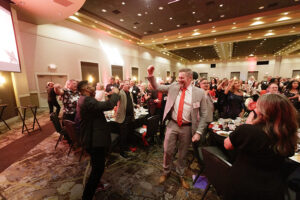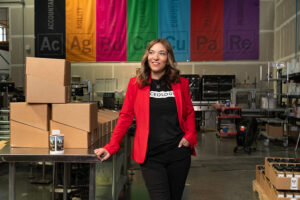Transformative Impact
Eastern goes public with its $100 Million “Build Our Future” comprehensive campaign.
The frontier settlement that had recently become Cheney wasn’t yet 5 years old when a committee of concerned citizens convened an urgent meeting at the offices of the town’s first newspaper.
The topic? Education, or the lack thereof. If their growing community was to thrive, the attendees agreed, it needed a place for the instruction of its young people. And soon.
Among those in attendance was an official of the Northern Pacific Company, the railroad line whose newly laid tracks had put the budding town on the map: “Why not ask our new director, Benjamin Cheney, to help?” he said.
Letters were promptly dispatched, and a short time later a second railroad official confirmed that, yes, its director was indeed interested in helping. Cheney would, he said, “furnish the means to build a school edifice, which would stand as a monument to Mr. Cheney’s memory, as well as provide the educational opportunities which he himself never had.”
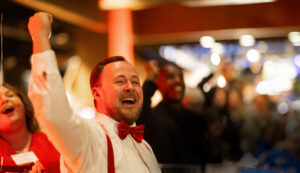
With his subsequent gift of $10,000 and eight acres of land — along with two teachers and several crates of books — Cheney made good on his promise.
The Benjamin P. Cheney Academy, constructed in 1882 on the hilltop site where Showalter Hall stands today, was a humble, two-story structure with an uncertain future. But thanks to the vision and determination of those who believed in its potential, the academy and its successors persevered, bouncing back after every setback to become one of the Pacific Northwest’s most dynamic engines of opportunity: Eastern Washington University.
Today, that visionary spirit lives on as EWU begins the final phase of the most ambitious fundraising effort in its 142-year history.
“Build Our Future: The Campaign for Eastern” is a $100 million comprehensive campaign that aims to open doors for a new generation of students, much as Cheney’s academy provided opportunities for aspiring educators in the late 19th century. By expanding scholarships, enhancing facilities, bolstering faculty hiring and investing in cutting-edge programs, the campaign will position Eagle students to earn life-changing degrees that prepare them for personal, professional and community-leadership success.
October’s elegant Red Tie Gala was the campaign’s joyous public debut, an announcement event almost a decade in the making. During two years of preparation and a subsequent seven-year “quiet” phase, the EWU Foundation and the university’s development and advancement-services teams were busy laying the groundwork for what was to come. Their work has already yielded impressive results, with donors stepping up to pledge more than $68.5 million — proof that the spirit of philanthropy runs as deep as ever in the Inland Northwest. These initial gifts are already funding scholarships, developing innovative learning hubs, and providing hands-on experiences that translate classroom concepts into real-world skills.
While universities have long relied on similar comprehensive fundraising efforts to support their students, the Build Our Future campaign is Eastern’s first. So why now? Why are tuition dollars and state support no longer enough?
The answer illuminates a worrying shift in American higher education. Over the past several decades, public universities nationwide have grappled with challenges related to the ups and downs of state and local backing. Even here in Washington, a state with a history of robust support for its colleges and universities, per capita spending on higher education tells a similar story. According to a study released by state education officials, “higher education is cyclical. When a revenue problem develops due to a recession, state support declines. Tuition increases have continually shifted costs to students, and state revenue shortfalls accelerate this process.”
Such uncertainties leave institutions like EWU in a tight spot. The university must either raise tuition — potentially pricing out the very students they aim to serve — or make cuts. Enter the comprehensive capital campaign, a fundraising tool that’s become increasingly crucial for public universities nationwide.
The concept of the comprehensive capital campaign originated in the early 20th century, as universities sought to fund expansion plans and endow professorships. In 1905, the University of Chicago launched one of the first, a groundbreaking $10 million effort that set the stage for the era of organized institutional fundraising.
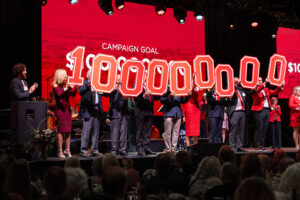
These days, comprehensive fundraising efforts like EWU’s Build Our Future campaign are a cornerstone of university advancement efforts, allowing institutions to tap into the generosity of alumni, corporations, foundations and community members to create a more diversified funding base. They serve as a focused, time-limited effort to secure gifts that can shape an institution’s trajectory for decades to come, supporting capital projects, endowed faculty positions, research initiatives and, crucially, scholarships that open the doors of higher education to students of all backgrounds.
Eastern’s President Shari McMahan sees each donation, no matter its size, as a vote of confidence in EWU’s mission. “Our generous donors are helping to create more opportunities to invest in the people, programs, and possibilities that define Eastern Washington University,” says McMahan. “Together, we are building a brighter future for our students and the communities we serve.”
“Our goal,” McMahan said earlier this fall, “is to make an applied learning experience a hallmark of an EWU degree, ensuring that every student has the opportunity to participate in hands-on learning that prepares them for a good-paying job and a meaningful career.”
Much as Cheney’s founding gift laid the groundwork for the successful careers of generations of Eastern graduates, McMahan sees EWU’s campaign as extending that same promise to a 21st century student body. The university’s goals are manifold, she says, but most dovetail into EWU’s renewed emphasis on experiential learning as “the region’s polytechnic.”
“Our goal,” McMahan said earlier this fall, “is to make an applied learning experience a hallmark of an EWU degree, ensuring that every student has the opportunity to participate in hands-on learning that prepares them for a good-paying job and a meaningful career.”
In short, Eastern aims to leverage Build Our Future donations to bring a diverse cohort of high-potential learners to its Cheney and Spokane campuses; to expand student research and internship options; to build bridges with regional businesses and organizations; and to recruit passionate, outstanding faculty members who will mentor the next generation of successful Eagles.
One example of the campaign already delivering on those ambitions is the Krumble Foundation’s Internship Stipend. Established by the foundation’s forward-thinking donors, the program provides up to $3,000 to EWU students who accept unpaid internships at nonprofit groups or government agencies. In an era where real-world experience is essential but often unaffordable, the stipend makes it possible for Eagles from all walks of life to access résumé-building opportunities that help launch careers.
Indeed, for many first-generation students, it is scholarships and programs like these that make the dream of a university degree attainable.
Jessica Avalos, who grew up in the agricultural community of Grandview, Washington, is one such student. Avalos’s parents, who didn’t have the opportunity to complete their own education, emphasized to Jessica and her 10 siblings that college enrollment was their best shot at future contentment. “And your happiness,” they said, “is what matters most.”
Avalos found that happiness in preparing for a career in healthcare. Initially aspiring to become a surgeon, she moved to Spokane after high school to pursue premed at EWU. In the fall of 2023, she changed course, joining the first cohort of students in the university’s new School of Nursing — all while working as a barista to make ends meet. Thankfully, the Proud Eagle Nursing Scholarship, established by alumni donors Kathy and Ken Privratsky, allowed Avalos to transition from her coffee-house gig to work as a nursing technician as she finishes her degree.
“I really needed it,” Avalos says. “The Spokane housing market is so expensive, but this scholarship helped me to remain in stable housing while I changed jobs to work in my field.”
The Privratsky’s scholarship was established to honor the heroic sacrifices of doctors and nurses during the Covid-19 pandemic, while helping students earn nursing degrees. Avalos hopes to someday meet the Privratskys and thank them in person. “They sound like such amazing and generous people,” she says. “I can’t believe they would do this for me, but I am so happy that they did.”
Brooklyn Parkey, who also received the Proud Eagle Nursing Scholarship, was inspired to pursue nursing by her mother, who went back to school to become a nurse while raising four children. “I admire her so much,” Parkey says. “I never thought about how hard that was!”
With the scholarship’s support, Parkey can work less and focus more on her studies. When she graduates, she plans to stay in Spokane and follow in her mother’s footsteps, helping to meet the healthcare needs of families in the region.
Both Avalos and Parkey are now paying forward Privratsky’s generosity. Together they established the Eagle Nursing Student Association to assist future nursing students as they prepare for careers in the Spokane region.
Carlos Valdovinos ’22 also understands how scholarships can make the dream of a university degree attainable. Born to parents who encouraged him to flee an increasingly dangerous mountain village in rural Mexico, Valdovinos arrived in Spokane with his sights on becoming a dental hygienist (read more about Valdovinos’s inspiring story in our Spring/Summer 2022 issue).
Donor-funded scholarships opened the door for him to pursue that calling at Eastern, where he quickly made a name for himself at EWU’s nonprofit Dental Hygiene Clinic, a teaching facility providing quality, low-cost preventive and restorative oral healthcare for Spokane and the surrounding region.
Gaining hands-on experience while serving the clinic’s diverse clientele, Valdovinos earned a reputation for his work ethic and empathy. Eastern’s attentive faculty, its scholarship support and experiential learning opportunities, meanwhile, positioned him for post-graduation success. Today, he is living his professional dream, delivering high-quality dental care at a Kirkland practice.
“I’m super happy that I chose dental hygiene at Eastern for my career path, because it was the perfect way to set up my future,” says Valdovinos. “It allowed me to explore the job I wanted, and to be prepared for it.”
Gaining hands-on experience while serving the clinic’s diverse clientele, Valdovinos earned a reputation for his work ethic and empathy. Eastern’s attentive faculty, its scholarship support and experiential learning opportunities, meanwhile, positioned him for post-graduation success.
Sometimes the impact of donor support extends beyond enabling students to pursue their chosen paths; it provides a lifeline in times of unexpected crisis. Samuel Steege, a hardworking 22-year-old communications studies major, received some well-timed assistance in the summer of 2023, thanks to the community of Eagles that support the university’s Giving Joy Day.
Steege was working as a server at Cheney’s Farmhouse Café when he got an urgent call from his father. A massive wildfire was approaching, and his dad needed help evacuating the family from their house in Medical Lake. Steege raced over to join his parents and siblings as they packed up possessions and the family pets. Two hours later, the Gray Fire destroyed their home.
An older brother’s house in Cheney became temporary housing for the family while they developed a plan to rebuild their lives. All told, the fire, just miles from Cheney, claimed some 240 homes and displaced hundreds of people.
“I’ve seen it in the movies, and heard about it, but never thought it would happen to me,” Steege says.
The EWU Student Emergency Fund quickly stepped up to help, providing assistance that kept Steege moving forward toward his degree. The Krumble Foundation also pitched in, providing Steege with an internship stipend to ensure he could cover living expenses while working as a communications assistant for EWU’s Office of Development.
“It feels good to know that there’s resources to help during crazy, unexpected times,” Steege says.
As it looks ahead to the concluding three years of its campaign, the EWU Foundation team is confident that stories like these will inspire support from additional donors eager to make an impact.
“I think that the philosophy of our philanthropy team is that we take pride in the investment our donors make,” says Barb Richey, vice president of university advancement and executive director of the EWU Foundation. “And that we can ask for that investment knowing that our donors will share that pride.”
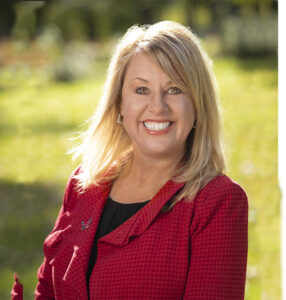
Richey ’92, ’99 joined the university’s leadership team five years ago. At the beginning, she recalls, there were doubts about whether a $100 million campaign goal was feasible. After all, the reasoning went, Eastern had never before sought donor involvement on such a scale and, as a result, had never developed the “giving culture” that bolsters similar fundraising initiatives at other universities.
Richey had little time for such thinking. “Building that giving culture isn’t easy, it’s true,” she says. “It can take years and years to get there. You have to really press hard — and keep your foot on the gas — to continue it. But you have to start somewhere. If you don’t ask people to give, you’ll never know if they will give. You have to build a case for support. And I don’t think that Eastern, in the past, had a collective sense of that need.”
That has changed, in no small part thanks to her.
“I’m a firm believer in what we’re doing here,” Richey says. “All gifts are significant, and I think that value message has resonated. I’m a dream maker; a storyteller. I believe it’s amazing what philanthropy can achieve when you share the dreams, the stories, and the aspirations of our students and faculty members; when you remind our community what private gifts can do to make Eastern’s shared vision a reality.” Remember also, Richey adds, that the power of giving has been woven into the fabric of EWU since Benjamin Cheney promised to provide a new school for an ambitious little frontier town. Eastern is now poised to offer a similar promise to a new generation. And to do it in ways that may come as a surprise.
“When we talk about our history, we always emphasize our humble beginnings.” Richey says. “We’ve always instilled humility: never been a ‘loud and proud’ kind of place. What a comprehensive campaign can do is change the culture. To make it okay to show your pride. For you to get out there on the street and yell, ‘Go Eags!’ We can be humble, sure. But we can also be loud and proud. That’s what we hope to achieve.”
Filed Under: Featured
Tagged With: Fall/Winter 2024-25

